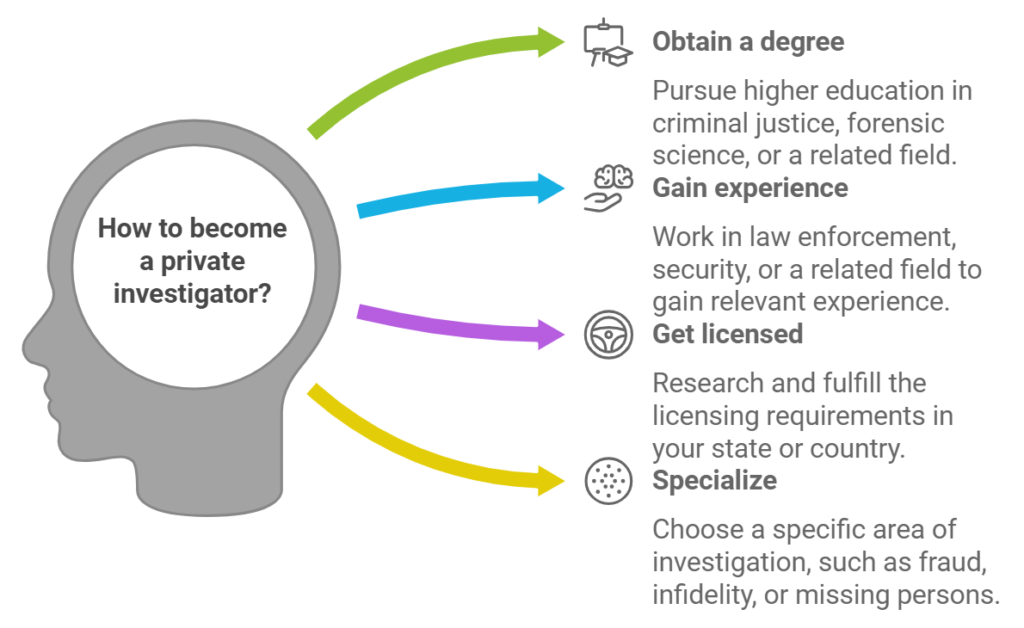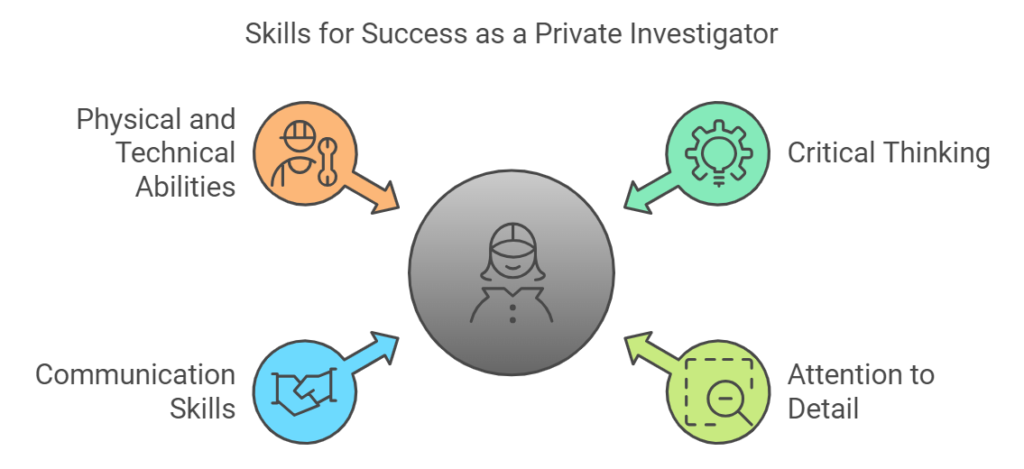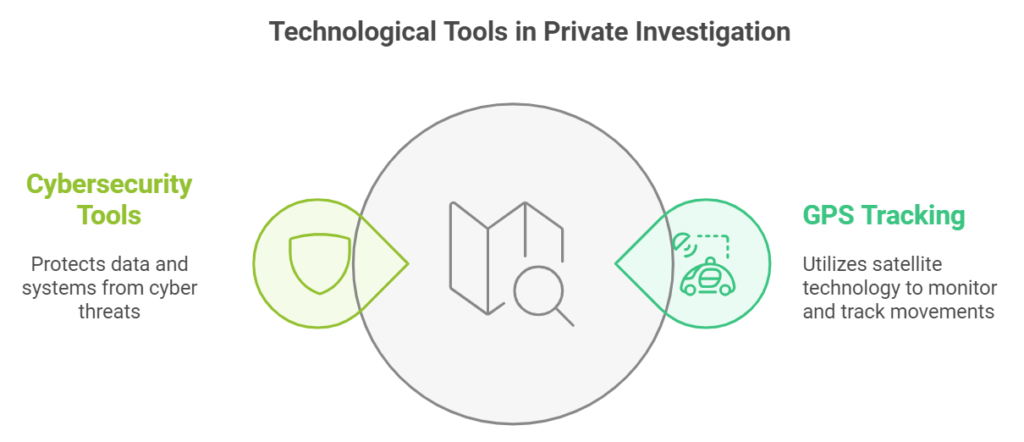Are you intrigued by the idea of solving mysteries, uncovering hidden truths, and helping people resolve personal or legal issues? Becoming a private investigator might just be the perfect career for you. Private investigators (PIs) are hired by individuals, businesses, and lawyers to gather facts and evidence, often helping to resolve cases that fall outside the realm of law enforcement. Whether it’s locating a missing person, investigating fraud, or conducting surveillance on a cheating spouse, PIs play a vital role in getting to the bottom of complex issues. But how exactly do you become a private investigator? Let’s break it down.

What is a Private Investigator?
A private investigator is a professional hired to conduct investigations that range from surveillance to finding people, digging into financial fraud, or collecting evidence for court cases. Unlike police detectives, private investigators work independently, often handling a variety of civil and criminal cases.
Types of Cases Handled by PIs:
- Infidelity and domestic cases
- Background checks
- Insurance fraud investigations
- Missing persons
- Corporate investigations
Skills Needed to Become a Private Investigator
To excel as a private investigator, you need a unique set of skills. Let’s explore some of the most crucial ones:
- Critical thinking and problem-solving: You’ll often be faced with incomplete or misleading information, so the ability to think critically and piece together clues is key.
- Attention to detail: Whether you’re conducting surveillance or going through documents, the small details can make or break a case.
- Communication and interpersonal skills: Private investigators often need to interview people or work with clients, which requires strong interpersonal skills.
- Physical and technical abilities: Depending on the case, you might need to conduct surveillance or handle technical tools like GPS trackers, cameras, or databases.

Educational Requirements
While becoming a private investigator doesn’t always require a college degree, there are educational paths that can enhance your skills and improve your chances of success.
- High school diploma or equivalent: This is the minimum educational requirement in most places.
- Degrees and certifications: While not always required, a degree in criminal justice, law enforcement, or forensic science can be beneficial. There are also certifications in private investigation that may help you stand out.
Gaining Relevant Experience
Experience can play a significant role in your ability to thrive as a private investigator. Many PIs have backgrounds in related fields.
- Law enforcement: Many investigators start out as police officers or detectives.
- Military service: Veterans often transition into PI roles, as their experience with investigations and surveillance can be easily adapted.
- Security or investigative work: Working in corporate security, loss prevention, or even journalism can provide useful investigative skills.
Licensing Requirements
In most states and countries, private investigators need to be licensed. The licensing process typically includes background checks, exams, and proof of relevant experience or education. Each state has its own requirements, so you’ll need to research the laws in your area.
- State-specific licensing: Some states require you to complete an exam, others require a combination of training and field experience.
- Background checks: Most jurisdictions require a clean criminal record, so a background check is typically part of the process.
Training Programs for Private Investigators
To sharpen your skills, there are training programs specifically designed for private investigators. These programs teach you how to gather evidence, conduct surveillance, and understand the legal limitations of your work.
- Online vs. in-person: Many programs offer online classes, but hands-on training can be invaluable.
- Continuing education: Laws change, and technology advances, so keeping up with the latest trends is important through continuous learning.
Building a Network in the Industry
Like many professions, networking is key. Whether you’re looking to learn from experienced investigators or need referrals, building a network can open many doors.
- Joining professional organizations: Consider joining groups like the National Association of Legal Investigators (NALI) or ASIS International, where you can connect with seasoned professionals.
How to Find Your Niche
Private investigation is a broad field. To stand out, consider specializing in a niche area. Some PIs focus on corporate investigations, others on domestic cases or fraud investigations.
- Specializations include: infidelity investigations, insurance fraud, corporate espionage, and more.
- Benefits of a niche: Focusing on a particular area allows you to build expertise and become the go-to person for certain types of cases.
Mastering Surveillance and Research
Surveillance is one of the bread-and-butter tasks for most private investigators. Knowing how to discreetly follow someone or gather information without being noticed is a must.
- Tools of the trade: Cameras, tracking devices, and specialized software.
- Conducting background checks: PIs often use public records databases, social media, and other resources to gather information.
The Role of Technology in Private Investigation
Technology plays an increasingly important role in private investigation, from GPS tracking to cybersecurity tools.

- Advanced tech tools: Drones, phone surveillance software, and computer forensic tools can help you gather critical evidence.
- Legal considerations: You must always stay within the bounds of the law. For example, wiretapping without consent is illegal in most jurisdictions.
How to Start Your Own PI Business
Many private investigators choose to work independently. Starting your own PI firm requires not just investigative skills but also business know-how.
- Licenses and insurance: You’ll need the proper business licenses and liability insurance.
- Marketing your services: Building a website, networking, and advertising your services can help you find clients.
- Creating a business plan: This will guide the development of your agency and help you stay focused on your goals.
Working for an Established PI Agency
If you’re not ready to strike out on your own, you might start by working for an established private investigation firm. This allows you to gain experience, learn the ropes, and build a network before going independent.
- Finding reputable agencies: Look for agencies with a good reputation in your area and a track record of success.
Legal Considerations
As a private investigator, you need to be intimately familiar with the laws governing your profession. Overstepping legal boundaries can not only jeopardize your case but also lead to legal repercussions.
- Understanding local laws: Laws vary by state and jurisdiction, so it’s crucial to know the specific regulations where you plan to work.
- Ethical considerations: Following ethical guidelines is not just important for your reputation but also for avoiding legal trouble.
Challenges and Rewards of Being a Private Investigator
Being a private investigator comes with its fair share of challenges. You might work long hours, deal with difficult clients, or face moral dilemmas. However, the rewards can be equally fulfilling, as you help people find the truth and provide solutions to their problems.
Conclusion
Becoming a private investigator is a challenging yet rewarding career path. From gaining the right education and experience to honing your skills in surveillance and investigation, the journey requires dedication and perseverance. But for those who love problem-solving and have a passion for uncovering the truth, it’s a career that can bring immense satisfaction.
FAQs
- How long does it take to become a private investigator? It can take anywhere from a few months to several years, depending on your state’s requirements, the time needed to gain experience, and whether you pursue formal education or certifications.
- Do private investigators need a degree? While a degree isn’t always required, having one in fields like criminal justice can provide an advantage and open more doors.
- Can private investigators carry firearms? This depends on state laws. In some states, private investigators can carry firearms if they have the appropriate permits and training.
- What kind of hours do PIs typically work? The hours can vary significantly. Some cases may require evening or weekend work, especially when conducting surveillance.
- How much do private investigators earn? The average salary for a private investigator varies based on location, experience, and whether they work independently or for an agency. It can range from $40,000 to $80,000 per year.
